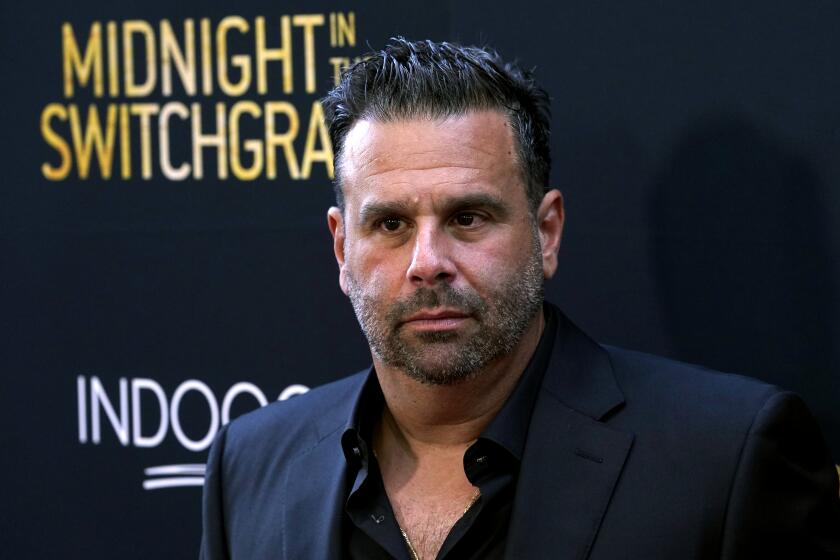MOVIE REVIEWS : Women Alone . . . With Children : Drama: ‘Men Don’t Leave’ tells of love, loss and life’s blissful unpredictability.
- Share via
Ever been so wretched that you ate Spaghetti-Os cold from a can? That the clean unsorted laundry piled up until it threatened to overrun the place? That’s major depression, and the wonder is that its numbing realities could be part of a movie with the surprise and the elation of “Men Don’t Leave” (at the AMC Century 14). The year’s first tonic, it’s a tender, beautifully acted, diabolically droll film on the subject of love, loss and the sheer blissful unpredictability of life.
It’s that unpredictability that holds the movie’s charm, not the picture’s subject matter, which is moving but far from startling. It’s the what-if nightmare familiar to every neurotic worthy of the name: “What would I do if I lost you?” Renovating their comfortable house in the suburbs of Baltimore, the Macauleys--John (Tom Mason) and Beth (Jessica Lange) and their sons, teen-age Chris (Chris O’Donnell) and 9-year-old Matt (Charlie Korsmo)--are a close-knit, cheerfully ordinary family until tragedy hits.
Director Paul Brickman, in his first film since “Risky Business,” and his co-writer, Barbara Benedek (of “The Big Chill” and, alas, “Immediate Family”), give this not-uncommon situation unexpected delights of character. While “Men Don’t Leave” is rooted in real emotions, it also has the highest concentration of grand and endearingly offbeat characters since “The Accidental Tourist.”
They include Joan Cusack as a preternaturally self-assured hospital X-ray technician; Kathy Bates as the Baltimore gourmet shop owner who finally employs the widowed Lange, and Arliss Howard as a witty, laconic composer whose music is scored for typewriters, full orchestra and pedal steel. The secret, of course, is that none of the three consider themselves offbeat; they simply go about their lives at an oblique angle to the rest of the functioning world.
Lange’s first months on her own with her sons are a litany of necessary adjustments: the crackerbox Baltimore apartment that takes the place of their overmortgaged, underinsured house; Lange’s desperately overbright job interviews and the boys’ unexpected choices of new friends in the big city. For O’Donnell, it’s Cusack, a ditsy “older woman” in their apartment building; for Korsmo, it’s a friendly fellow fourth-grader who uses a switch-blade to divide his Milk Duds and whose after-school activities would give his parents nightmares, if they ever suspected them.
The screenplay is most perceptive as it suggests the ways that even the most closely knit family can unravel. Lange must cope with her 17-year-old’s playing man of the house--at her house and Cusack’s; with her 9-year-old’s poignant search for an ideal family, and with her own growing depression as she tries to keep every base covered at once.
The script may strain our good will slightly with its lottery-ticket subplot or with Arliss Howard’s deadpan Charles Simon, who seems to have every virtue--including being recently unattached. Immediately intrigued by Lange, his remedy for her sadness is an uninhibited night out at a polka hall “where everybody’s fatter than you and there’s no shame.” A lusty, measurable attraction springs up between the two, both recovering souls, but unfortunately Howard arrives too soon in her mourning process.
Intellectually, we know that this patient, funny guy is too good to be on the loose; he’s as pluperfect as Alan Bates’ character in “An Unmarried Woman.” But the film’s buoyantly good dialogue and Howard’s offbeat charm may be seductive enough to make you want to put these quibbles aside.
Beth Macauley emerges as a performance of heart, complexity and enormously subtle shadings, Lange’s best since “Tootsie.” It’s nice to have an outlet for Lange’s humor again, in physical moments like her hilarious polka scene, or as she snarls in outrage as the professionally soothing Cusack marches in to treat her clinical depression.
“Men Don’t Leave” (rated PG-13) doesn’t depend on Lange’s virtuosity alone, however; it’s ensemble stuff in the hands of an uncommonly sensitive and inventive director. Its most poignant scene goes to Chris O’Donnell, pleading his mother’s case with Howard. Brickman wisely keeps his camera on the boy’s agonized face and lets the scene run until it cracks the heart.
In among these adult pros--including a Cusack at the very top of her form and a hell-for-leather character for Kathy Bates--what Brickman has gotten from these two young debuting actors is stunning. Subject to a barrage of conflicting emotions, O’Donnell is sensitive, funny and furious, by degrees, and the younger Korsmo seems likely to take over from the gifted Lukas Haas as that actor grows into older roles.
Every single technical credit is fine: Bruce Surtees’ moody, evocative lighting camerawork; Richard Chew’s impeccable editing; Susan Becker’s deliberately unchic costumes for Lange; the production design of Barbara Ling and Curt Frisk’s sound recording, which turns the noise of that X-ray, buckling in O’Donnell’s hand as he prepares to meet adulthood, into witty aural punctuation.
More to Read
Only good movies
Get the Indie Focus newsletter, Mark Olsen's weekly guide to the world of cinema.
You may occasionally receive promotional content from the Los Angeles Times.










